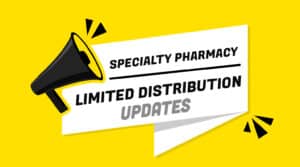Another $2.8 million gene therapy was approved this month. So, we need to ask….. Are we looking forward to the day when specialty pharmacies as we know them will go the way of the buggy whip? Inevitably, the answer is yes. Maybe not soon….. but its ‘a comin!
When a leading PBM like Optum raises a red flag about something one should pay attention. They make the point in the article below that gene therapies are here and that more are in development. The specter of a hoard of budget busting drugs would make all payors quake in their boots.
So far, gene therapies have targeted ultra-rare diseases and conditions, and they currently account for nearly half of FDA approvals in recent years. The technologies being used to develop these ‘one shot and cured’ therapies are advancing at a rapid pace. One only needs to ask when the technology will enable researchers to develop gene cures for other more common diseases like hemophilia….. oh wait, that’s already happening!
Specialty pharmacies might want to imagine a time not so far in the future when gene therapies will be one shot and cured solutions for ALL of the disease states that they support. It would only be a matter of time before there aren’t any more patients in need of long-term therapy. It might look a lot like the last days of the buggy whip business model. Just sayin’
——————————————————————–
The gene therapy pipeline may be at a ‘tipping point’.
Optum says payers need to take notice
Should they be approved, the drugs highlighted in this quarter’s report would double the number of gene therapies on the market to four, and it’s a trend payers should be keeping a close—and early—eye on. (UnitedHealth Group)
The response to COVID-19 likely slowed the development of pricey gene therapy drugs, but those products are now making their way back into the approval pipeline, according to a new report from Optum Rx.
The pharmacy benefit manager released its quarterly look at the drug development pipeline. The latest analysis spotlights two gene therapy products headed to the Food and Drug Administration’s approval table this fall: elivaldogene autotemcel, under the brand Skysona, and betibeglogene autotemcel, as Zynteglo.
Both therapies are for rare conditions, with Skysona targeting cerebral adrenoleukodystrophy (CALD) in young boys and Zynteglo treating beta thalassemia patients who depend on blood transfusions.
Orphan drugs currently account for nearly half of FDA approvals, and gene therapies like Skysona and Zynteglo carry particularly high price tags. Should they be approved, these drugs would double the number of gene therapies on the market to four, and it’s a trend payers should be keeping a close—and early—eye on, said Bill Dreitlein, senior director of pipeline and drug surveillance at Optum Rx, in an interview.
“COVID has had somewhat of an impact, delaying the development of some of those products but now I think we’re starting to see a small wave of those products coming to market,” he said.
He said if the wave of gene therapies swells, it could signal a “tipping point” for these drugs.
Both Zynteglo and Skysona are developed by bluebird bio. Analysts forecast that a single dose of Zynteglo could cost $2.1 million, and there are an estimated 3,000 people in the U.S. with beta thalassemia, with about half dependent on regular transfusions.
The report doesn’t list a potential price for Skysona but notes that Zolgensma, a gene therapy currently on the market for the ultra-rare condition spinal muscular atrophy, costs $2.125 million per dose. There are about 40 people in the U.S. with CALD annually, according to the report.
And because these drugs treat conditions that are so rare, the data on long-term efficacy is limited, but that information would be another consideration for payers weighing coverage. For both drugs, there is data available from seven years of follow-up.
Insurers and PBMs “only know as much as the data available to us,” which makes tracking these products key, Dreitlein said.
“Now is a good time to get back into monitoring the gene therapy pipeline,” he added.






